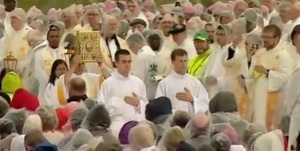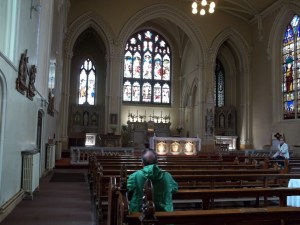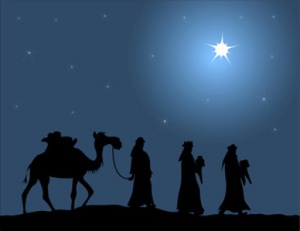What’s in a name? There is an experience that I believe is pretty common to all of us….when either mother or father was displeased, and …called us by our first, middle and last names…..we knew a response was demanded (and it usually meant we were in big trouble)
There is a certain power in knowing and using the name of another; this is nothing new…from ancient times, there was a belief that to know and to be able to use the name of another, particularly in the spiritual world, meant to be able to control what or who was being named…to have power over them. This has been reflected over centuries in a number of ways – and explains why in certain cultures, people are very hesitant to offer their names to strangers….it’s something that evolved into what we considered good manners…that children did not use the familiar or first names of their elders, because the junior should not have control over the elder who was raising, teaching, mentoring or leading them.
Our first reading today from the book of Deuteronomy relates how Moses passed on instructions from God to the children of Israel concerning Prophets. Through Moses, God tells them that He will continue to express His Word and instruction through prophet s after Moses is gone…this is the same God who revealed His own name to Moses on Mount Sinai before the Israelites were led out of slavery in Egypt…but rather than using the name of God in a way to try and control God’s power for his own use, Moses surrendered himself and acted as a conduit; a vehicle through which God would speak to His people; God is quite explicit in his words in this particular passage; “Anyone who does not heed the words that he shall speak in my name, I myself will hold him accountable….” And later, “or presumes to speak in my name a word that I have not commanded…that Prophet shall die,”
Very strong and graphic language, but it stresses how important it is that God’s Word and the authority and sacredness of God’s name should not be taken lightly, or used for personal gain or personal motives and agendas.
Individuals have from time to time presumed to falsely speak on behalf of God; in fact, through history, there have been times when certain people have done some pretty horrendous things, claiming to be speaking or acting in God’s name or by the guidance of God’s Holy Spirit….we also have seen throughout history some tremendous good done and inspired through those who speak on behalf of God. In our own generation, we have seen genuine prophets…Blessed Teresa of Calcutta, Blessed Pope John Paul II, Jean Vanier…
To determine when someone claims to be passing on God’s Word, there are signs and instructions for each of us in Sacred Scripture…but the simplest bit of wisdom in this regard came from Jesus when he talked about those who truly follow Him…”by their fruits you shall know them.” True prophets speak to us of God’s justice for the poor, of healing, of devoting our selves and our lives to God, bringing others to know and love Him; sharing His love no matter what state we live in life – clergy or religious, married or single.
But the Church is in a far better position than individuals to determine when God is genuinely speaking or not, and that is why claims of prophecy or revelation should be submitted to the magisterium (the Holy Father in union with the bishops) to determine their genuineness…the teaching authority was given to the Church by Christ Himself, when he commissioned the Apostles after His resurrection as related in St. Matthew’s Gospel, and when He breathed the Holy Spirit on them, as related in St. Luke’s. Over the centuries, this same Holy Spirit has continued to guide and direct the Church ; the Holy Spirit has inspired great saints, doctors of the Church, who have further discerned and explained the meaning of salvation history speaking for God; and even these great people, these prophets who could have had their own following and gain, submitted their writings and words to the Church to determine their authenticity, and never claimed honor for themselves ; there are those who have attacked and attempted to divide and tear the Church apart – sometimes even claiming to be guided by the Holy Spirit or speaking for God – would do well to remember the Words from Deuteronomy, that God Himself will hold those accountable who do not heed His words or presume to speak Words that He has not given them…..One of the fruits of the Holy Spirit is peace and unity…. Would the Holy Spirit which guides the Church, turn on Himself in His own teaching from outside? Rational thought would tell us, “not likely”…..
But this knowledge that there is power in God’s name is a tremendous temptation to some. So too is the knowledge that there is great power in the name of Jesus; and that the use of His name should be reserved to the sacred, the prayerful, and the prophetic.
In his Gospel, St. Mark describes for us an incident early in Jesus’ ministry, at the synagogue in Capernaum. In the midst of teaching in the synagogue, Jesus encounters a man, described as ‘possessed by an unclean spirit’; this spirit is evil, and has attempted to destroy this man – this child of God. A brief dialogue is recorded for us, that this evil spirit, speaking through the man asks, “what have you to do with us Jesus of Nazareth? Have you come to destroy us?”
If we were standing on the sidelines at this point, we could just as easily answer for Jesus and say, ‘Yes’…this spirit is evil, and Christ has come into the world to destroy evil…but the dialogue continues with this demon saying “I know who you are, the Holy One of God.”
At this, Jesus tells the spirit to be silent…in the early Greek , it is more closely translated “Be muzzled!” –very authoritative speech….Jesus will not let the demon speak further for a couple of reasons; first, if it is spread publicly that He is the Messiah, before His ministry follows God’s will, God’s own course – his sacrifice for the salvation of all people – that ministry might by impeded by people trying to push Jesus into the political power that they thought the Messiah represented.
Another reason, is that in an act of desperation, this evil spirit tries to control Jesus by using His name; and Jesus, in His authority as the Son of God and with that power, turns that aside, showing that no one – angel or demon or human – has the power to control God or His Son either by their actions, claims or using the name of either God or Jesus;
Sadly, our society seems to have forgotten about the sacredness of either name. In a rush to be politically correct, it seems we are almost forbidden to use either the name of God or Jesus in a prayerful, respectful, prophetic way in public. Turn on the television or listen to casual conversation the next time you’re in a public place….it is far more socially acceptable in public, to use either the name of our Creator or our Redeemer as a curse word, or an expression of anger than as an expression of love; it is more socially acceptable to use the name of Jesus in a mocking way, to ridicule those who follow Christ, than to use His name in a sense of reverence. But of course, to use the names of lesser beings, people from other religions in the same irreverent way, would be roundly condemned in our society.
The profaning and degrading of the name of Jesus or the name of God is not a little thing that simply moved into human culture on its own. It is not influenced by God or the Holy Spirit. It is an evil thing, is influenced by evil, and is something we would do well to stay away from.
A far better use of the name would be in prayer; There is a specific prayer going back to the 4th century called the Jesus Prayer, which is this ;”Jesus, Son of God, have mercy on me a sinner.” and is repeated over and over, as long and as often as one would like.
A far better use of the name would be in reverence; as it says in Scripture; At the name of Jesus every knee should bend….
A far better use of the name would be in determining our actions; that whatever good we may do, we can not claim credit for in our own name; that we do it for and in the name of God.
Praised be Jesus Christ, now and forever!





